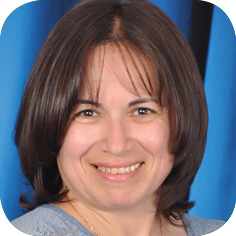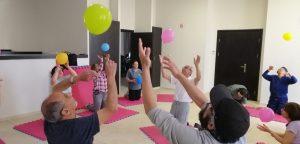My late grandmother kept a small, orange shoebox on the highest shelf of her dark-brown closet. This priceless box shone, like our eyes, every time our grandmother picked it up to show us its contents. She used to hold it in both her hands with such care that sometimes I had the feeling that something would break if it were accidentally dropped on the floor. I can’t forget the terrified face of my grandma when our little cousin – out of curiosity – almost dropped the shoebox while trying to see what was inside. Although there was neither jewelry nor money inside the box, it was full of photos of various sizes in different tones of black and white that represent happiness, joy, and precious memories of my grandma’s life.
It is hard to forget two particular photos in this box. The first one shows young women wearing Palestinian thobes (Palestinian traditional dresses) and holding relatively big metallic cans on their heads. When we asked about it, we learned that the women would fill the cans with water from a nearby stream to be used back at their houses for daily needs. The second photo was of a very special engine-less bus that was pulled by horses.
Sadly enough, life has changed and become more complex since my grandma was young. Nowadays, we simply open the tap to access potable water. And it is amazing how many cars now crowd our city of Ramallah, whereas donkeys and horses used to be the main means of transportation. How lazy we have become just sitting behind the wheels of our cars, staring at our smartphones, or being stuck at our desks, overwhelmed by the tremendous amount of stress that impacts our daily life. This is why it is so important to include sports, exercises, riyada (Arabic for sports), or physical activities in our daily routine. The already high prevalence of obesity and a sedentary lifestyle among the population in Palestine is expected to increase during the next decade.*1
The World Health Organization (WHO) defines physical activity*2 as “any bodily movement produced by skeletal muscles that requires energy expenditure.” On the other hand, “physical inactivity (lack of physical activity) has been identified as the fourth leading risk factor for global mortality (6 percent of deaths globally). Moreover, physical inactivity is estimated to be the main cause for approximately 21–25 percent of breast and colon cancers, 27 percent of diabetes and approximately 30 percent of ischemic heart disease burden.”
It goes without saying that engaging in some activity and exercise is always better than remaining inactive. Working out for just a few minutes will help grow and preserve brain cells. Even just two minutes of riyada per day yields health benefits.
According to the Palestinian Central Bureau of Statistics (PCBS), around 5 percent of the Palestinian population are above the age of 60,*3 and only 3.2 percent are above the age of 65.*4 And yet the most expensive health procedures are required to treat preventable diseases such as heart disease*5 that mainly affect this age group and that could be easily prevented by simple riyada and a healthy diet.
Unfortunately, Palestinian popular culture does not encourage elderly people to get out and exercise. Generally, there are no special places where older people can freely do simple exercises that have a positive impact on their health and well-being. Recently, however, the Ramallah Municipality has established the Forum of Expertise, a community center that focuses on older people’s needs and priorities and hosts riyada lessons – free-of-charge – every Saturday that are tailored to the elderly (members of the forum). They are facilitated on a voluntary basis by one member of the forum, Mr. Kamal Shamshoum, a 77-year-old retired physical education instructor who was an assistant professor at Birzeit University. He is in great shape − inspiring − and engages the participants in physical riyada that uses simple and affordable equipment. Around 20 people regularly and enthusiastically attend the Saturday riyada lessons.
Based on the WHO recommendations, adults aged 65 years and above*6 should do at least 150 minutes of moderate-intensity physical activity throughout the week, or at least 75 minutes of vigorous-intensity physical activity throughout the week, or an equivalent combination of moderate- and vigorous-intensity activity.
Regardless of the official definitions of physical activity and a physically inactive lifestyle, regular exercise has a great influence and positive effect on the physical, social, and mental well-being of individuals – in particular, older adults – not to mention the benefit to the health care system and its budget.
*1 “Cardiovascular diseases, diabetes mellitus, and cancer in the occupied Palestinian territory,” The Lancet, April 2009, available at https://fada.birzeit.edu/bitstream/20.500.11889/2071/1/3-cardiovascular3-diseasesdiabetescancerinoPtAbedetc2009.pdf.
*2 Global Strategy on Diet, Physical Activity and Health: Physical Activity and Adults, WHO, available at https://www.who.int/dietphysicalactivity/factsheet_adults/en/.
*3 On the Eve of World Elderly Day 1/10/2018, PCBS, available at http://www.pcbs.gov.ps/post.aspx?lang=en&ItemID=3264.
*4 On the Occasion of the International Population Day 11/7/2018, PCBS, available at http://www.pcbs.gov.ps/post.aspx?lang=en&ItemID=3183.
*5 Marwan Mosleh, Yousef Aljeesh, Koustuv Dalal, “Burden of Chronic Diseases in the Palestinian Healthcare Sector Using Disability-Adjusted Life Years (DALY), Palestine,” Diversity and Equality in Health and Care 13(3), 2016, @2016 Insight Medical Publishing Group, available at http://diversityhealthcare.imedpub.com/burden-of-chronic-diseases-in-the-palestinianhealthcare-sector-using-disabilityadjusted-lifeyears-daly-palestine.pdf.
*6 “Global Recommendations on Physical Activity for Health: 65 years and above,” WHO, available at https://www.who.int/dietphysicalactivity/physical-activity-recommendations-65years.pdf?ua=1.




